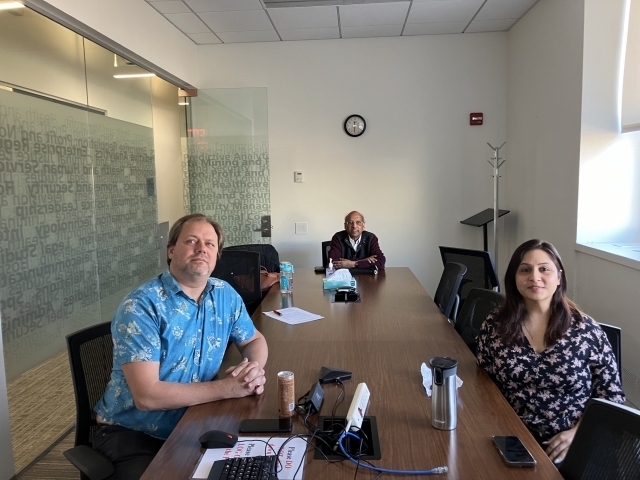
The impact of development on poorer populations in rural India was the subject of the first in a series of environmentally focused lectures sponsored by the Vincentian Chair of Social Justice at St. John’s University on November 30.
Part of the Chair’s 2023–24 lecture series, the online discussion “Abuse of Creation and Its Effects upon the Marginalized in Asia,” brought together members of the University’s administration and faculty, and students, religious leaders, and educators from Goa, India. Goa, on the country’s west coast, has been the focus of government-sponsored development efforts that have relocated local populations while transforming the small state from an agrarian economy to one rooted in tourism.
Goa is considered one of the most biologically diverse regions in Asia and government attempts at development have been met with resistance from environmentalists, students, and farmers’ groups. Left behind in Goa’s drive toward progress has been the region’s poor.
“We live in an extremely fragile marine ecosystem,” said Yamah Angelica Marchon, a student and the youngest member of the Roman Catholic Archdiocese of Gao and Daman’s Commission for Ecology. “When the Indian government began a project to divert one of our rivers, it meant an entire ecosystem would die out. We who live in Goa would lose our culture and our livelihoods. This was an injustice to people.”
The idea for the lecture series, which will continue in Spring 2024, was rooted in Pope Francis’ 2015 encyclical Laudato Si’, in which the pontiff outlined his vision for the natural world and the relationship between God, people, and the planet. A vital element of the encyclical is the responsibility developing nations have to ensure the care of their poor.
The unifying theme of the six-lecture series is “Cry of the Earth, Cry of the Poor.” Lectures will highlight environmental and socioeconomic challenges facing a country on each continent. On February 8, St. John’s representatives will connect with students and administrators from Kenyatta University College in the African city of Nairobi, Kenya.
Among the St. John’s presenters was Shweta Dilip Singh Sinha, Ph.D., the first-ever student to earn a doctorate in Multi-Sector Communication from The Lesley H. and William L. Collins College of Professional Studies. Dr. Sinha’s dissertation focused on gender disparities in environmental issues and included research about India, where she earned her master of business administration degree.
According to Dr. Sinha, India’s development initiatives have often come at the expense of its commitment to the rights of its female citizens, especially poorer women.
“Capitalism drives the need for more industries and more unfettered development,” Dr. Sinha said. “But in a patriarchal society like India, it’s often women who bear the brunt of the development activities. It’s women who do the work of drying and selling fish. It’s women who go into the forest to collect firewood to sell. So it’s women who lose their livelihoods when agriculture and the fisheries are impacted by development.”
Development initiatives have created competition for essentials among India’s poor, including for drinking water, the panelists from Goa said. Equitable access to the planet’s resources is emphasized in Laudato Si’. Inspired by the encyclical, Alisha Pereira, treasurer of the Chicalim Youth Farmers Club, said the group of about 30 students is pushing back against development efforts that have compromised environmental justice in Goa.
“We as a group often reflect on the wounds and sicknesses we have given to the soil, to the air, and to all forms of life,” Ms. Pereira said. “If we can give one message to people, it is that if we don’t save Goa now, it will be forever lost to future generations.”
Mark D. Juszczak, Ed.D., Associate Professor, Division of Mass Communication at St. John’s, noted that competition for living essentials is not unique to India. Referencing the western United States, Dr. Juszczak noted how seven states share water rights to the Colorado River. As in India, the issue of who determines the priority of those rights is not easily resolved.
“The majority of the water in the Colorado River is used by California, so we have a capacity for federal regulation and oversight,” Dr. Juszczak said. “The question I have is, how strong is the Indian national government in regulating or in justly adjudicating issues of water rights?”
Absent a truly just distribution of the planet’s resources, the consequences for civilization could be dire, said Rev. Bolmax Pereira of St. Francis Xavier Church in the Goa community of Chicalim.
“A third world war could happen because of water and rivers,” Fr. Pereira warned. “People who want and need water and parched lands are everywhere. The irresponsibility we have shown in handling our waters is what in my opinion could lead to such a fight.”
Related News
Vincent’s Table Brings Dignity and Support to Students Facing Food Insecurity
Food insecurity among US college students is a rising problem. About 3.8 million college students experienced food insecurity in 2020 and it has only grown steadily worse.
Leading with Heart: Lucy A. Pesce Recognized for Changing Lives at St. John’s
Commitment to the Vincentian mission shone brightly last week when Lucy A. Pesce, Executive Director for Mission Initiatives at St. John’s University, was honored by Depaul USA with the Dax Champion Award for her unwavering leadership and compassion. Ms. Pesce’s recognition highlights not only her personal dedication but also the University’s broader mission to uplift and serve individuals experiencing homelessness.
Vocation Festival Showcases Diversity of Opportunities in Religious Life
Eager to help young people discern a call to religious service, representatives of 13 Catholic congregations gathered in the D’Angelo Center plaza for St. John’s University’s fourth annual Vocation Festival.
